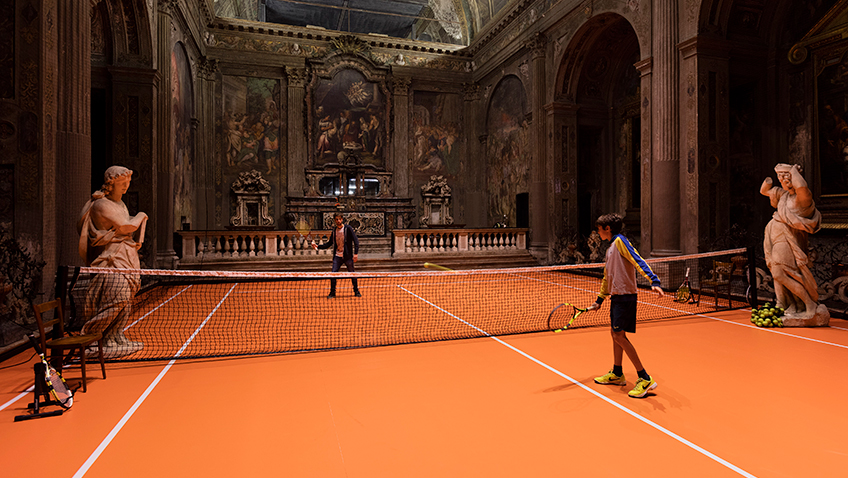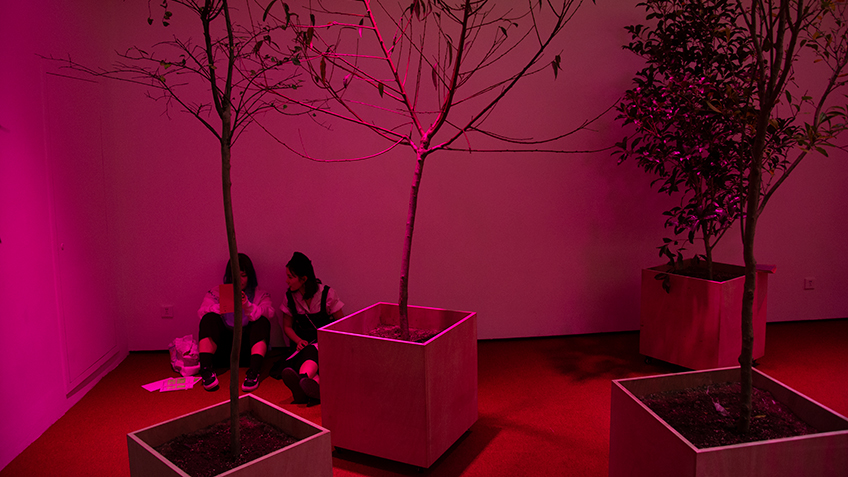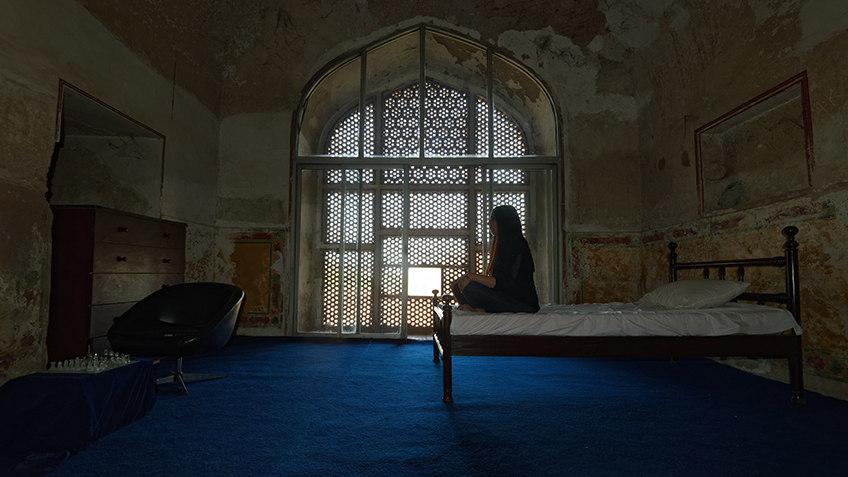Kaldor Public Art Projects and Carriageworks today announced the names of the artistic and scientific collaborators who will take part in Kaldor Public Art Project 34, Absorption, by Asad Raza.
Kaldor Public Art Projects is pleased to announce a collaboration with the University of Sydney Institute of Agriculture. The scientific elements of Absorption are led by Professor Alex McBratney with his colleague Associate Professor Stephen Cattle.
Raza’s Absorption will be presented free to the public from 3 until 19 May 2019 in the Clothing Store building on the Carriageworks site in Eveleigh, Sydney.
Much of Raza’s work has a strong collaborative dimension. During his visits to Australia over the past year, Raza has invited artists to develop initiatives that move the project beyond an individual artist’s vision to a project that evolves and changes throughout its duration. Focussingon dialogue and collaboration, these artist interventions take the form of installations, performances, and experiments.
Daniel Boyd will create an installation affecting a porous light within the Clothing Store, while Khaled Sabsabi and Dean Cross will create works that directly intermingle with the project’s organic elements. Agatha Gothe-Snape will create wearable pieces for the cultivators who will care for the project throughout its duration.
Brian Fuata will create a piece to be performed daily in the exhibition space, an ongoing performance the artist conceives of as a ‘haunting’.
Raza will work with Jana Hawkins-Andersen on a series of destructible clay works containing organic material and with Megan Alice Clune on a sound work that periodically responds to the installation.
In lieu of a traditional public program, Absorption will feature a series of interventions— choreographic, musical, and pedagogical. These will include a new choreographic collaboration between Ivey Wawn, Ivan Cheng, Daniel Jenatsch, Eugene Choi, and Taree Sainsbury; a pop concert by Chun Yin Rainbow Chan; an event hosted by Kandos School of Cultural Adaptation; and a reading hosted by feminist reading group Composting.
Collaborators include: Daniel Boyd, Stephen Cattle, Chun Yin Rainbow Chan, Megan Alice Clune, Dean Cross, Brian Fuata, Agatha Gothe-Snape, Jana Hawkins-Andersen, Alex McBratney, Khaled Sabsabi, and Ivey Wawn.
Daniel Boyd
Daniel Boyd’s practice is internationally recognized for its manifold engagement with the colonial history of the Australia-Pacific region. Dynamic historical compositions are revealed only through the hundreds of pixelated ‘lenses’ applied to the canvas. These lenses allow us to look at the spaces between them thus highlighting the liminal space between black and white, the ‘other’ and the ‘enlightened’. Boyd has both Aboriginal and Pacific Islander heritage and his work traces this cultural and visual ancestry in relation to the broader history of Western art. Boyd has been exhibiting in numerous solo and group exhibitions in Australia and overseas since 2005.Boyd was recently included in Adelaide Biennial of Australian Art:Divided Worlds(2018) and the travelling exhibition 3rd National Indigenous Art Triennial:Defying Empire, National Gallery of Australia, Canberra (2018). He has held solo exhibitions at the Institute of Modern Art, Brisbane (2016), Artspace, Sydney (2013) and at the Natural History Museum, London (2012). Boyd’s paintings are held in major public collections in Australia as well as notable international collections such as the SamdaniArt Foundation, Dhaka, Bangladesh and the KadistCollection in Paris, France.
Stephen Cattle
Stephen grew up on a wheat-sheep farm in central western NSW, and graduated from the University of Sydney with a BScAgr(Hons I) in 1991 and a PhD in Soil Science in 1995. He was appointed as a lecturer in soil science in the Faculty of Agriculture in 1997. Since then, he has taught in soil science and agricultural science units, carried out research on dust as a soil-forming factor and on agriculturally important soils of NSW, and has served in various Faculty and University administrative roles. Stephen has been the Associate Dean (Teaching & Learning) in the Faculty of Agriculture, Food and Natural Resources, and the chair of the Academic Board’s Undergraduate Studies Committee. In the soil science community, Stephen has served as Federal President of the Australian Society of Soil Science Inc., and has been a champion for the discipline of soil judging in Australia since 2012.
Chun Yin Rainbow Chan
Chun Yin Rainbow Chan works across music, performance, and installation. Born in Hong Kong and raised in Sydney, Rainbow is interested in mistranslations, diaspora and the effects of globalisation on modern Chinese society. Melding bubbly, textured soundscapes and off-kilter electronics with her pop sensibilities, Rainbow’s songs consistently evolve to reflect of her changing ties to desire, memory and space.
Megan Alice Clune
Megan Alice Clune shifts between musician, composer, and artist. Primarily, her work consists of a dissection of musical elements and contexts through verbal or text-based scores, sound installation, and collaboration. Megan has presented work and undertaken residencies across Australia, Europe and North America, including the Bang on a Can Summer Music Festival (MA), Underbelly Arts, Next Wave Festival, Performa 15 (NYC) and Vivid Live at the Sydney Opera House.
Dean Cross
Dean Cross was born and raised on Ngunnawal/NgambriCountry and is of Worimidescent. He is a trans-disciplinary artist primarily working across installation, sculpture, and photography. His career began in contemporary dance, performing and choreographing nationally and internationally for over a decade with Australia’s leading dance companies. Following that Dean re-trained as a visual artist, gaining his Bachelor’s Degree from Sydney College of the Arts, and his First Class Honours from ANU School of Art and Design. In 2019, Dean will undertake the inaugural Canberra/Wellington Indigenous Artist exchange, where he will be supported by the ACT Government to undertake research with the National War Memorials in both Canberra and Wellington.
Brian Fuata
Brian Fuata works in performance through live and mediated forms. He employs various modes of presentation within the framework of structured-improvisation. In Fuata’s works, the act of viewing is a reciprocating action between artist and audience and audience with each other. Fuata employs the ‘blank sheet’ as a recurring motif in his work, which transforms with different contexts into emails, paper, Word.Doc,google.doc,SMS text, concrete, film, and in the case of his 20-minute ghost performances, a white bedsheet.Solo works includeCare disfigurements (flowers),Art Central Hong Kong Art Fair (2019);Placeholder, Enjoy Gallery, Christchurch (2016);A predictive/preparatory performance for a circuit of email and the living,Performa Biennial, New York (2015);Untitled(ghost machinery refit/letting go of the sheet),ChisenhaleGallery, London (2015);Close to the knives (one to five)email performances, forEndless Circulation,Tarrawarra Biennale, Tarrawarra (2016);FIFO Ghost,Liquid Architecture at the National Gallery Victoria, Melbourne (2015);Apparitional Charlatan…for 24FramesPerSecond, Carriageworks (2016);Privilege (performance),Museum of Contemporary Art Australia, Sydney (2015);Points of Departure: one to three,email performance,Australian Centre for Contemporary Art, Melbourne (2014).
Agatha Gothe-Snape
Agatha Gothe-Snape works at the threshold of visual arts and performance. She has a highly trained and deeply attuned understanding of performance strategies and how they intersect not only with the visual but with the relational and architectural. As a result, her works are singular, embracing the complexity, ambiguity and slippages of both performance and language in an aesthetic style that is questioning, poetic, and political. Gothe-Snape has exhibited in major international biennales including the Gwangju Biennale, South Korea (2018), 20th Biennale of Sydney (2016), PERFORMA, New York(2015), and the 8th Berlin Biennale for Contemporary Art, (2014). In 2017, she presented a solo exhibition at the Mori Art Museum, Tokyo. She has exhibited widely in Australia at artist-run spaces, state-funded institutions, and museums. Her work is held in major collections across Australia. Gothe Snape is actively involved in Wrong Solo, a collaborative performance group that she began in 2006 with fellow Sydney artist, Brian Fuata. She also has a long-standing collaboration with choreographer and dancer Brooke Stamp, as well as artist Sarah Rodigari, and dancer and choreographer Lizzie Thomson.
Jana Hawkins-Andersen
Jana Hawkins-Andersen is an artist based in Sydney, working in sculpture and ceramics.Through arrangements that display impact, touch, and absorption between materials her work focuses on a politics of intimacy and care.Presented asco-dependent, parasitic installations, the work considers the entangled experiences of care and trespass and examines the viewer’s relationship to complicated objects that contaminate and disrupt.Jana completed her MFA at UNSW Art and Design in 2018 and was a co-director at Firstdraft, Sydney from 2017-2018.
Alex McBratney
Alex McBratneyholds BSc, PhD and DSc degrees in soil science from the University of Aberdeen in Scotland, and the DScAgrdegree from the University of Sydney for research in precision agriculture. He has made major contributions to soil science and agriculture through the development of the concepts of Pedometrics, Digital Soil Mapping and Precision Agriculture. After completing his PhD work at Rothamsted Experimental Station in the UK, Alex spent seven years with CSIRO Division of Soils in Brisbane. Alex joined the University of Sydney in 1989. He is currently Director of the Sydney Institute of Agriculture and Professor of Soil Science. He is Editor of the global soil science journal, Geoderma. He is heavily involved with the activities of the International Union of Soil Sciences and the global digital soil map project, GlobalSoilMap. In 2014 he was awarded the VV Dokuchaevmedal by the International Union of Soil Sciences, which is the highest honour in the soil science discipline. Currently he is helping to develop and promote the concepts ofglobal soil security anddigitally decommoditisedagriculture.
Khaled Sabsabi
Khaled Sabsabi’s process involves working across art mediums, geographical borders, and cultures to create immersive and engaging art experiences. He see’s art as an effective tool to communicate with people, through a familiar language. Sabsabimakes work that questions rationales and complexities of nationhood, identity, and change. His practice speaks to audiences in ways that enlighten our understanding of universal dynamics which are more complex and ultimately more unknowable than our own selves.
Ivey Wawn
Ivey Wawnis an independent artist working between Sydney and Melbourne. Her practice emerges from dance into the choreographic, dealing with systems to build live performance situations for a range of contexts. Her work has been shown at Underbelly Arts Festival, FirstdraftGallery and at RMIT Design Hub among others. She was recipient of the DanceWEBScholarship in 2016, a Responsive Residency through Critical Path in 2018, and the 2019 Performance Space Experimental Choreography Residency. Ivey is a student of Political Economy at the University of Sydney and also sells her labour as a waiter between projects.


